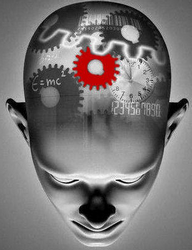 Recently I had the privilege of hearing anti-racist writer and speaker Tim Wise speak at Messiah College’s urban campus. While ostensibly focusing on four major points, Wise covered a range of topics all pertaining to the reality of racism in the 21st century. One point that stood out to me was his discussion of implicit or unconscious racism.
Recently I had the privilege of hearing anti-racist writer and speaker Tim Wise speak at Messiah College’s urban campus. While ostensibly focusing on four major points, Wise covered a range of topics all pertaining to the reality of racism in the 21st century. One point that stood out to me was his discussion of implicit or unconscious racism.During this era when we are remembering the 50thanniversaries of the significant events of the Civil Rights movement, Wise pointed out that it is easy for people to think that because people of color are no longer being hosed and beaten, and because the Civil Rights Act and subsequent legislation made intentional acts of racial discrimination illegal, racism no longer exists in our society. However, as he aptly described, racism is unfortunately alive and well in both systemic forms (such as Michelle Alexander highlights regarding the criminal justice system in The New Jim Crow or students in the Philadelphia School system experience every day in their grossly underfunded public schools) and in the unconscious bias we all carry around in our heads.
Wise talked about an experiment that was conducted a few years ago in which adults were evaluated on the level of their unconscious or implicit bias. The participants were pre-tested for their basic views and attitudes on racism, and the most were found to be very open-minded, progressive thinkers when it came to issues of racial diversity and inclusion. The participants were then placed in front of computer screens and electrodes placed on their heads to register brain activity. They were shown images that flashed on the screen so quickly that their conscious minds were not able to recognize the images, but their subconscious minds were. The researchers noted the brain activity as the images flashed by. When an innocuous image like a tree or a flower was shown the brain registered minimal activity, but when an image of a black or Latino male was shown, the brain activity spiked in 90% of the white participants. In African American participants the brain activity spiked nearly 50% of time.
Wise contended (and I would agree) that this experiment points to the reality that anyone living in the United States for any period of time carries within their psyche unconscious or implicit racism. Because of the way we are socialized, the images we are exposed to in the media, the way our history highlights some issues and ignores or excludes others, and the choices we are presented, nearly all white people, as well as a significant percentage of people of color, develop a deep-seated bias that influences their attitudes, perspectives and actions in subtle but real ways that lead to propagating or supporting racist practices in our institutions and personal lives. [For someone who would like to take a simpler version of the test mentioned above they can take the Implicit Bias Test at this link. ]
 While the term is not unique to me, for many years I have regarded myself as a recovering racist. Several years ago I worked in an alcohol rehabilitation program with people going through the 12 steps of Alcohol Anonymous as part of their recovery. What I learned is that in AA people never talk about being “recovered” from alcoholism or addiction; rather they refer to themselves as “recovering”, that is always in the process of recovery. In the same way I seriously doubt that as a white person I will ever get to the point where I am over being racist, rather I will always be in the process of dealing with my implicit and explicit racism. As such just like the recovering alcoholic, I must work every day to be aware and address the racism that has been bred into me as a member of this society.
While the term is not unique to me, for many years I have regarded myself as a recovering racist. Several years ago I worked in an alcohol rehabilitation program with people going through the 12 steps of Alcohol Anonymous as part of their recovery. What I learned is that in AA people never talk about being “recovered” from alcoholism or addiction; rather they refer to themselves as “recovering”, that is always in the process of recovery. In the same way I seriously doubt that as a white person I will ever get to the point where I am over being racist, rather I will always be in the process of dealing with my implicit and explicit racism. As such just like the recovering alcoholic, I must work every day to be aware and address the racism that has been bred into me as a member of this society.Through over 30 years of dealing with my own in-bred racism, I have learned some things about my own implicit racism and how to address it. First, just like the recovering alcoholic, I need to admit that I have a problem, that in fact I am racist. Unfortunately most white people when confronted with the reality of racism spend an inordinate amount of energy denying that in fact they have racism in their psychological and emotional make-up. The most frequent response is to say “I’m not racist, I’m colorblind.” While I suspect their intent is to say that they try not to act in a racially prejudiced way, one cannot really live in this society and not notice race. It’s much better to let go of the charade of colorblindness and simply admit we see and experience people differently in part because we see them as a racial other. Try as we might to do otherwise, that racial discrimination has been built into us.
Second, as a white person, once I have admitted I am racist, it is important to pay attention to the dynamics of racism around me. Authors like Michelle Alexander, Cornel West, bell hooks, Tavis Smiley, Tim Wise, Joe Feagin and others have written extensively on the ways racism operates in the institutions and systems of our society. Peggy McIntosh in her classic article on White Privilege has pointed out how privilege often keeps whites ignorant and oblivious to the subtle and not-so-subtle barriers and indignities faced by people of color every day. Once we have read those books and heard those speakers, we need to pay attention and notice the way racism operates all around us. For many whites paying attention to the pervasiveness of racism is like waking up to a whole new reality.
Third we need to seek out relationships with folks, both white and people of color, with whom we can talk about our observations and experiences. Over the past twenty years I have been fortunate to develop close relationships with friends and colleagues where race is a common topic of discussion; and not in some abstract way but in very personal ways. I have actively sought to become parts of groups and organizations where the leadership is predominantly people of color. In one such group we were discussing the recent movie “The Butler;” for several of the folks of color in the room the movie had evoked memories and painful emotions that I never would have known had I not been in the conversation. These friendships keep me aware and force me to realize how limited my perspective can be.
Fourth, as a white person I need to ask the next question: What has race got to do with it? This is a question people of color have to ask all the time as they experience people and events, but which white people rarely ask. Whites are socialized to ignore and downplay the impact of race on experiences and events in their lives. Tim Wise told of an experience when he was 23 years old and locked the keys in his girlfriend’s car. For over 20 minutes he tried to break into the car until a police officer came by. Expecting that the officer would ask for identification and an explanation for his actions, he was surprised when the officer not only neglected to ask those questions but then proceeded to join him in his efforts to break into the car, even at one point suggesting they smash the window. Wise then raised the question: How would that scenario played out if he had been a 23 year old black man? What has race got to do with it? Sometimes the answers we come will not be clear cut, but the question must be asked.
Finally, as a white person I need to practice being an ally to people of color. For the past two years I have been researching and writing a book I have entitled White Allies for Racial Justice, which hopefully will be published within the next year. In the book I define an ally as a person who recognizes that various forms of discrimination and who chooses to work alongside people who are targets of that discrimination to change the attitudes, practices and institutional structures that propagate that discrimination. As an ally I do not act out of some sort missionary or savior complex, but rather out of the deep recognition a world free of oppression is a world of dignity, equality, humanity and justice, and therefore is a better world for all people regardless of their race or social position.
As much as some would hope that we have been able to move beyond racism, it still continues to shape our lives and distort our perspectives in 2014. As white people we have a choice to either keep our heads in the sand and ignore the reality of suffering and oppression around us, or we can commit ourselves to create the kind of society that works for all people. The journey starts within each one of us asking ourselves – are we willing to be recovering racists? Are we willing to admit our own need to recover from our implicit, unconscious racism? Are we willing to ask the hard questions and ally ourselves in solidarity with brothers and sisters of color to build a post-racist society? Only in this way can we work on our recovery from the racism that infects our society and disables us all.

